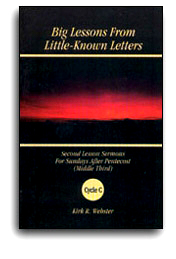SermonStudio
Who Can You Trust?
Sermon
Big Lessons From Little-Known Letters
Second Lesson Sermons For Sundays After Pentecost (Middle Third) Cycle C
Eggs are good -- eggs are bad -- eggs are good if around two to three are eaten per week. Eggs are bad for you if you have high cholesterol. Yeah, right. How could something so simple and pure be so controversial?


